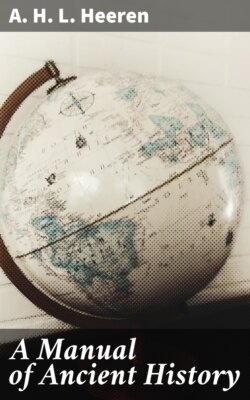Читать книгу A Manual of Ancient History - A. H. L. Heeren - Страница 14
На сайте Литреса книга снята с продажи.
I. The Jewish state as one single kingdom from 1100 (1095)—975.
ОглавлениеSaul:
1. Saul, the new king, strengthened himself on the throne by a victory over the Ammonites; and a general assembly of the nation, in which Samuel laid down his office as judge, unanimously acknowledged his sovereignty. But Saul, no sooner became a conqueror than he threw off the tutelage of Samuel, and ventured himself to consult Jehovah. This was the occasion of a feud between them. Samuel, offended, privately anointed another young man, David the son of Jesse, as king. David acquires fame and popularity by his heroic conduct; but has much difficulty in escaping the jealousy of Saul.—Saul sustains himself amid constant wars with the neighbouring nations; slain about 1055. but at last defeated, he and all his sons, except one, lose their lives.
Jewish government and state under him.
2. State of the nation and constitution under Saul.—The king little more than a military leader under the direction of Jehovah; without either court or fixed residence.—The people still a mere agricultural and pastoral race, without wealth or luxury; but gradually assuming the character of a warlike nation.
David, 1055—1015.
3. Saul was succeeded by David; but not without opposition. Eleven tribes declare for Ish-bosheth, the remaining son of Saul; and David is only acknowledged by his own tribe, Judah. It is not till seven years later, and the murder of Ish-bosheth by his own people, that David is recognized as king by the whole nation.
State of the nation and government in his reign.
4. Complete formation of the nation, and a change of constitution during the reign of David over the united kingdom, which lasted thirty-three years. Jerusalem is made the seat of government and of the national sanctuary. Rigid observance of the worship of Jehovah, the exclusive religion of the nation, considered in respect to its political consequence.
Conquests.
5. Vast aggrandizement of the Jewish state by conquest. A war with Hadadezer opens the way to the conquest of Syria and Idumæa. Extent of the kingdom from the Euphrates to the Mediterranean; from Phœnicia to the Red sea. Gradual decline towards despotism and seraglio government; the political consequences of which become apparent about the end of David's reign, in the rebellion of his sons.
Solomon, 1015—975.
6. Reign of Solomon. The brilliant government of a despot from the interior of his seraglio; unwarlike, but civilized, and fond of parade. New organization of the kingdom for the support of the court. Connections formed with the neighbouring states, particularly with Tyre; hence a participation in the southern trade carried on from the ports of the Red sea, conquered by David; but only as a monopoly of the court.
Declension of the state.
7. The capital enriched by the splendour of the court; but the country oppressed and impoverished, particularly the distant tribes. Gradual internal decay hastened by the admixture of the worship of foreign gods with that of Jehovah; although Solomon, by the erection of the temple according to the plan of his father, seems to have wished to make the worship of the true God the only religion of the country. An unsuccessful attempt at rebellion made by Jeroboam; and by the Edomites, who remain tributary under their own kings: actual secession, even during the reign of Solomon, of the conquered province of Syria by the foundation of the kingdom of Damascus.
Rehoboam.
8. Solomon is succeeded by his son Rehoboam, who has scarcely ascended the throne, before the malcontents, increased in number by his imprudence, break into open rebellion. Jeroboam is recalled from Egypt, and ten tribes acknowledge him as their king. Only two tribes, Judah and Benjamin, remain faithful to Rehoboam.
